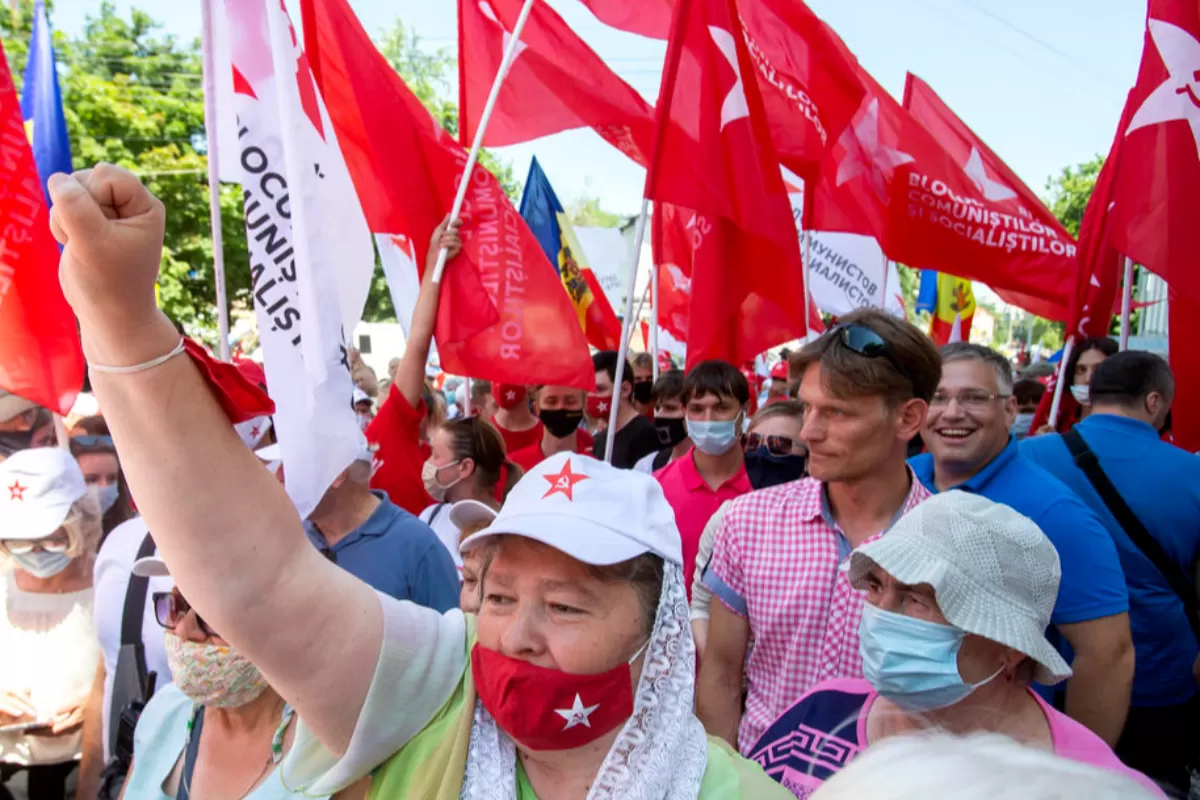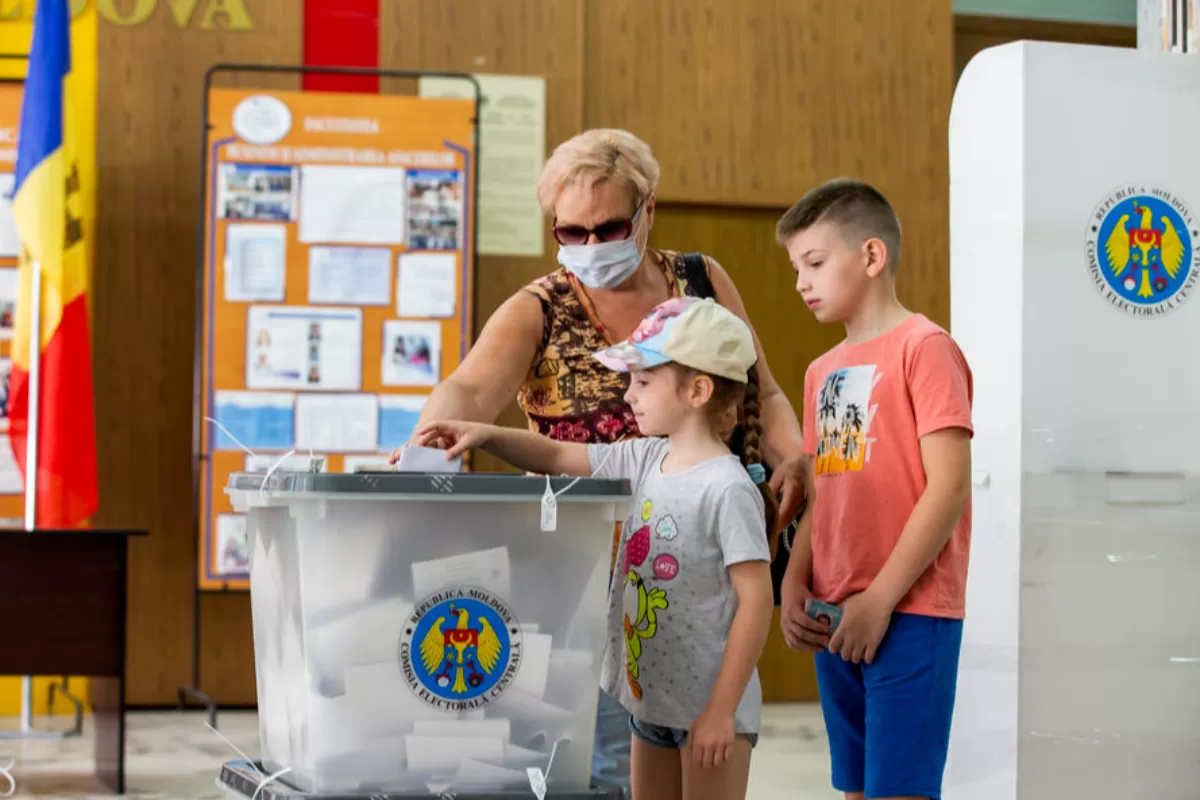
Much like most other election campaigns in the Republic of Moldova, this summer’s campaign for the parliamentary election of July 11 was ridden with disputes which, at times, went way beyond the limits of common decency. We’ve seen controversial figures getting the spotlight, a great deal of disinformation, and we’ve had our fair share of extraordinary and laughable moments. Foreign policy was, once again, a major topic of debate. Less than 30 years since Moldova proclaimed its independence, it’s still unclear whether the country is headed West or East. Another recurring theme in this campaign was the fight against corruption, which has been discussed for years, without seemingly rooting out the weed of corruption that has spread to the point of nearly suffocating the whole country. Veridica has reviewed some of the topics, episodes and characters that grabbed the headlines during this election campaign.
Organizing the vote for Moldovans abroad was the headline-grabbing topic for a number of weeks, during which time the case was transferred from one court of law to another, and from one judge panel to the next. Finally, the Central Electoral Commission (CEC) opened a record-high number of polling stations – 150, compared to the initial number of 139, although less than the 191 recommended by the Foreign Ministry.
On the other hand, CEC set up 44 polling stations for voters on the left bank of the Dniester, twice the number opened for the presidential election, of which three in towns and villages that are not controlled by the authorities in Chișinău. Following a string of protests and the court ruling, the three stations were given up. Amidst fears that voters in Transnistria could be bought off, on Thursday evening, a court of law ruled in favor of reducing the number of polling stations to 12, although the ruling can be appealed. Besides, CEC could simply disregard it.
The billion-dollar bank fraud of 2014 was, again, one of the favorite topics for debate. Candidates blamed each other of having played a part in the affair, to a greater or lesser extent. Although the fraud is a commonplace topic, the odds the money should make its way back to the state budget are hardly worth the debate.
Along similar lines, Socialists and pro-Europeans have locked horns to take credit for overthrowing the regime led by the wanted billionaire Vlad Plahotniuc, and have accused each other of engaging in dealings with him. However, there are few voices in Chișinău talking about actually taking Plahotniuc to court, even though two years ago everyone was bragging they would be the ones to bring him back in cuffs to Chișinău.
As always, electoral promises have flooded the media, yet most turned out to be your common, stereotypical populist artifice: according to a study carried out by Expert-Grup, making good on these promises would entail budget appropriations of nearly 5 billion Euro (a huge amount of money for Europe’s poorest country), or an annual economic growth of 10%.
On June 24, the famous German daily Bild wrote that Russia allegedly bankrolled 11.5 million Euro into Igor Dodon’s campaign for the presidential election last year, which he lost. The Party of Socialists denied the truthfulness of the documents published by Bild.
Ten days later, New Europe, a website that previously published articles favoring certain controversial politicians in Chișinău, like Vlad Plahotniuc or Ilan Shor, wrote that the West allegedly funded PAS and Maia Sandu, offering them 56 million Euro. What’s interesting is that this lengthy piece of news was picked up and published by media outlets controlled by the Socialists both in Romanian and Russian, which suggests a concerted action.
Three days later, eureporter.co published another investigation, quoting various conversations and documents which Igor Dodon reportedly sent to a Russian businessman, Igor Chaika. According to the investigation, the Socialists were ready to pay 2.5 million Euro to buy off voters in Transnistria and thus defraud the election.
While most of the candidates enrolled in the election claim the fight against corruption is one of their priorities, most controversial figures, which are featured in the most infamous criminal scandals in the Republic of Moldova, are either running for office themselves, or represent other candidates, campaigning on their behalf on all TV channels.
One of them is Ilan Shor, president of Shor Party and top of the list for Parliament. Although in the former legislature he attended only one plenary session, fleeing the Republic of Moldova shortly afterwards, he’s now returned with a renewed claim for an MP seat. He’s been virtually present every day on social media, promising citizens he would bring Europe home. Sentenced in the court of first instance for his involvement in the 2014 bank fraud, Shor demanded his arrest warrant be repealed so that he could meet with voters.
Veaceslav Platon represented the only independent candidate in the race, Veaceslav Valico, and appeared on televised debates on his behalf. Platon is considered the “brains” of a money-laundering operation in Russia, with figures exceeding 20 billion dollars. He also stands accused of having illegally taken over a number of businesses. Platon is also thought as the man behind a company with a number of litigations in the Republic of Moldova, claiming damages in the dozens of millions of Euro.
Former PSD deputy Cristian Rizea, who’s taken refuge in the Republic of Moldova after being handed in sentence in Romania, was also invited on TV stations to represent the obscure WE Party. Rizea actually wanted to run for office, but CEC ruled out his bid.
The We Build Europe at Home Party (PACE), led by a former chief of police who served under a number of Cabinets, had the most “poetic” campaign launch, featuring a young girl rising from a coffin.
Still, by far the most savory show for the media was put on by the Alliance for the Union of Romanians (AUR), launched in the Republic of Moldova on the eve of the election campaign. Several of AUR’s actions in the campaign resulted in scandals and even physical violence. AUR activists protested and even spent the night in front of the SIS building, repeatedly trying to enter Transnistria, and organizing a counter-protest to a march staged by the Socialists. Former Chișinău Mayor, Dorin Chirtoacă, was close to assaulting Dodon and Voronin, only to be stopped by security forces. A representative of AUR beat down a police officer, and during another event, Chirtoacă was slapped by a Socialist, his glasses flying off his face. To exact his revenge, Chirtoacă wrapped Lenin’s statue in black plastic bags.
Vasile Costiuc, the leader of another party of unionist positioning until recently, was hit with a baton on his back while running away from a security guard on the bridge across the Dniester.
The leader of the Party of Regions, Alexander Kalinin, went on hunger strike before the Government building, as a sign of solidarity with the employees of the Moldovan Railway Company, which for years have been reporting delays in their salary payments.
Electoral debates were also peppered with scandal. Kalinin threw a bottle of water on the floor of the film set during a televised debate, upset the questions weren’t in Russian. During another debate, Rizea gave Platon a roll of toilet paper, urging him to “stop eating shit”. Platon, who claims to be living off on his 60-million-dollar savings, took the roll of paper with him upon exiting the shooting set. And, during a live debate, Platon didn’t refrain from eating the cucumbers Platon had offered him.
In the last days of campaign, a video surfaced depicting Dodon while “hunting” wild boars locked in an enclosure, and another one showing him enjoying himself while trying out the new presidential chair. Both videos were apparently shot with the former president’s personal phone.
Opinion polls in the Republic of Moldova are usually at odds with the results of the election. This ballot will be even more complicated, as we don’t even know for sure how many parties will make it to the new Parliament. Three candidates are dubbed as favorites – PAS, the Bloc of Communists and Socialists, and Shor Party. According to some surveys, the alliance of Renato Usatyi, the Mayor of Bălți, as well as the Dignity and Truth platform, are also expected to meet the electoral threshold.
The website alegeri.md rounded up the survey figures, and according to their calculations, PAS would grab 43% of the vote, followed by BeCS with 34%, Shor Party with 7%, and that will be it. Under these circumstances, PAS would secure a majority in Parliament, allowing it to form a new Cabinet. If one or two other candidates succeed in entering Parliament, then a ruling coalition will be required, mostly likely including PAS, although an alliance between Dodon, Shor and Usatyi might still be an option, despite the latter having denied the possibility.
No party in the Republic of Moldova has managed to secure a Parliament majority since 2009, and PAS would be the first right-wing party to achieve that. A potential PAS majority would provide Maia Sandu with a loyal Parliament and a Government that can implement her pro-European reform agenda. It would be a very good opportunity, but also a great risk, both for herself and the right-wing overall, in case of a failure. On the other hand, a left-wing coalition would continue to fuel the conflict between president, Parliament and government and would prolong uncertainty, including in terms of Moldova’s foreign policy.

Disinformation uses a variety of manipulation tactics. Disinformation stories can easily be created by combining provocative topics.
Report
Not even the most optimistic supporters of the Action and Solidarity Party (PAS) were expecting a landslide victory in the early parliamentary election. PAS didn’t just face left-wing parties, represented by the Electoral Bloc of Communists and Socialists, but Russia itself, which tried to lend the latter a helping hand. Yet its victory is only the beginning: the real challenge for PAS lies ahead.

FAKE NEWS: The right-wing bought votes in the Diaspora
The alleged election fraud, including bribe-giving, was one of the hot topics in the Republic of Moldova on election day. While media outlets siding with pro-European parties revealed alleged cases of bribe reported on the left bank of the Dniester, the pro-Socialist press focused on offenses reported abroad. One the main “arguments” about influencing voters in the Diaspora was a short video filmed by a young girl queuing outside a polling station in Frankfurt, Germany. In the background one can hear a few people talking and laughing, mentioning 50 Euro. A large number of press institutions affiliated to the Socialists carried the piece of news, suggesting the video is evidence that voters got bribed. The person who shot the video subsequently said it was all a joke, and that the media made erroneous assumptions.

DEMAGOG 2021. The Chisinau Report, No. 5: Radio Yerevan
disinformation, manipulative stories and fake news continued to flood the media as usual. Maia Sandu, PAS and the West were again the favorite targets of disinformation and fake narratives. Fake news authors were pretty much unimaginative, as they have been over the course of the entire campaign, resorting to narratives they used before, both in the current campaign, as well as in previous ones: a victory for the right-wing would spell disaster for the country